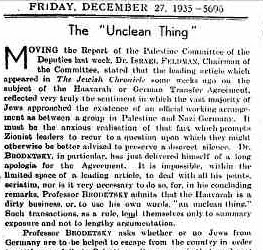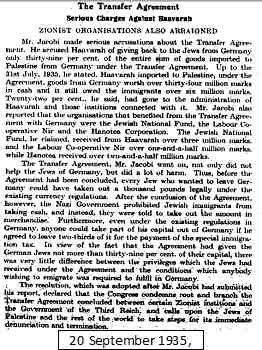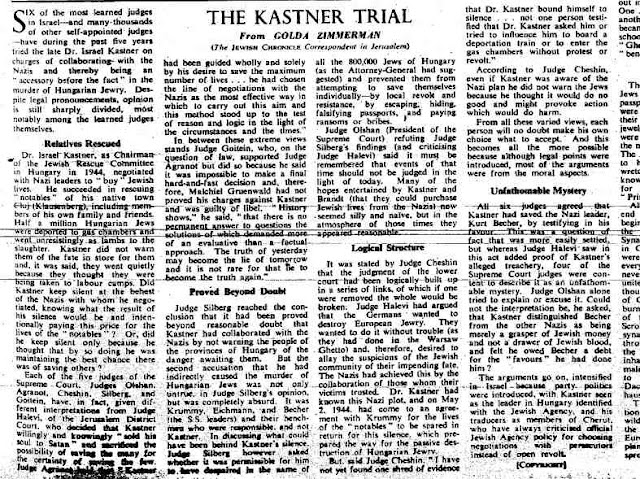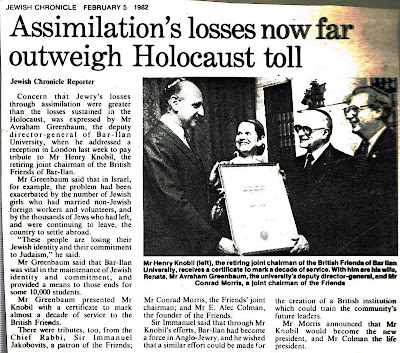Instead of supporting and strengthening the Boycott of Nazi Germany, the Yishuv (Jewish Palestine) was sabotaging it
![]()
Tom Segev whose book Elie Wiesel reviewed

Before you decide to report this post to Labour’s compliance unit, in order that they have more evidence to use for my expulsion hearing, please be aware that this is taken from an old and excellent review below by Eli Wiesel.
Let me explain that I have little time for Wiesel, a winner of the Nobel Peace Prize. He is a self-serving Zionist propagandist. The conclusions he drew from the holocaust was that Jews must be strong regardless of how much they persecute others. He has given wholehearted backing to Israel’s attacks on the Gaza Strip.
 |
| How the Jewish Chronicle saw Ha'avara, the Zionist-Nazi trade agreement at the time |
Nonetheless Wiesel, is a survivor of Auschwitz. He was deported from Hungary, the last major Jewish community to be deported. He was a victim of Rudolf Kasztner, the leader of Hungarian Zionism, who made a pact with Adolf Eichmann. In return for a train taking 1684 of the Zionist and Jewish elite to safety out of Hungary, he would ensure that the remainder of Hungary’s Jews were pacified and misled as to where they were being deported. They were led to believe they were being ‘resettled’ in Kenyermeze, a place that didn’t exist. Hungary’s Jews, but for the collaboration of Kasztner, the Zionist ‘rescue committee’ and the Judenrat (Jewish Council) would not have lost nearly ½ million people.
 |
| Jewish Chronicle Article attacking Zionists' trade agreement Ha'avara which broke the Jewish boycott of Nazi Germany |
Elie Wiesel confirmed that ‘We were taken just 2 weeks before D-Day, and we did not know that Auschwitz existed… everyone knew except the victims.’ Nicholls, W. Christian Anti-Semitism: A History of Hate, London: Jason Aronson Inc., 1993 353.. Wiesel asked ‘Why didn’t we know? To this day I try to understand what happened. If ever there was a tragedy that could have been prevented, it was that one.’ [“The ‘Myth’ and Reality of Rescue from the Holocaust’, p.10. citing Wiesel’s introduction to Braham and Bel Vago, The Holocaust in Hungary 40 Years Later (New York: Columbia University Press, 1985), p. xiv].
Wiesel’s review of the critical but excellent Israeli historian, Tom Segev’s book The 7th Million deserves reprinting now that Ken Livingstone is in hot water for having told the truth about Nazi support for the Zionist movement.
Tony Greenstein
The Land That Broke Its Promise : The Seventh Million: The Israelis and the Holocaust, By Tom Segev (Hill & Wang)
This review was translated from the French by Marion Wiesel
Had Israel existed in 1939, would the Holocaust have been averted? Did Israel need Auschwitz to be born or reborn? These questions have surfaced over and over again. They are heavy with implications. I, myself, choose to view these two events in Jewish History as mysteries linked not as cause and effect but by chronology.
 |
| Rudolf Kasztner - Hungarian Zionist leader who exchanged the Hungarian Jewish community for 1684 of the elite Zionists and Jews in Hungary |
What follows is not meant to mitigate the guilt of the killers and their collaborators; nothing can ever diminish that. Still, on a different level, not all others are beyond reproach.
Israel, for some of us, is much more than a geographical or political notion; it is the very heart and conscience of our people. Even inside the "Kingdom of Night," there were inmates who dreamed of Jerusalem, who were convinced that in Tel Aviv and Haifa, Givat-Brenner and Hulda, our brothers and sisters were crying for us and with us. Our faith in Jewish solidarity was total. Had anyone dared to suggest that during the darkest hours of our history, the leaders and inhabitants of Palestine were not overwhelmed by compassion for their deported fellow Jews, we would have dismissed him as a traitor.

 |
| Jewish Chronicle Report of Supreme Court decision in Kasztner Trial 31.1.58. |
There is no comparison between Ben Hecht's inflammatory pamphlet and Segev's study. The latter is sober and balanced, and therefore, all the more disturbing. Segev tells of his torment as he gradually discovers the extent to which the Jewish victims in Europe were let down by their co-religionists in Palestine.
Let us examine the strange episode of the haavar or "transfer."
In the mid-1930s, after Hitler's rise to power, while American Jewry fought to organize an economic boycott of Nazi Germany, the leaders of the Palestinian Yishuv entered into active, though unofficial, negotiations with Berlin regarding the transfer of German Jews and their wealth--some 30 million pound sterling--to the Holy Land.
 |
| The Zionists compare assimilation (Jews marrying non-Jews) to the annihilation of Jewry by Hitler |
 |
| A comparison of a Jewish child under the Nazis and a Palestinian child under Israel |
But Segev goes on to show, supported by devastating evidence, that later, even as Germany carried out its Final Solution--liquidating one ghetto after another, one community after another--the Jewish leaders of Palestine never made the rescue of European Jews into an overwhelming national priority. We know that Zionist leader Itzhak Gruenbaum, a future Minister of the Interior in David ben Gurion's first cabinet, considered creating new settlements more urgent than saving Jews from being sent to Treblinka and Birkenau.
Read Segev's heartbreaking conclusion:
"There had been about nine million Jews in Europe on the eve of the war; about six million were killed, leaving three million alive. Most of them were saved by Germany's defeat in the war. Some were spared thanks to the help they received from various governments and organizations such as the Joint Distribution Committee and from thousands of good-hearted people in almost every country--the "righteous Gentiles." There were dramatic rescue operations such as the flight across the Pyrenees from France to Spain and the convoys of Jews that sailed from Denmark to Sweden. Only a few survivors owed their lives to the efforts of the Zionist movement."

They needed to bear witness and no one wanted to listen. Except if the stories glorified Jewish heroes and partisans. The proud citizens of Eretz Israeldid not want to hear about the suffering, the oppression, the agony, the humiliation of hundreds of thousands, of millions of their own people. It was only after the trial of Gestapo head Adolf Eichmann that the teaching of the shoah, a term as inadequate as the term "Holocaust," began to be taken seriously in Israel.
Of all that Segev reports in this singular book--the unsuccessful plans for revenge, German reparations, the complex relations with Bonn--the chapter about the Israelis' attitude toward survivors is the most painful.
While it is not my role to corroborate his claims, I can relate my own experience when I arrived in Israel in June 1949 on my first visit there. I had been sent by a Parisian weekly to write a series of articles on the metamorphoses death camp survivors were undergoing in their new homeland. The survivors' comments fill me with sadness, as they did then. They spoke of the arrogance of old-timers who asked why they had not immigrated to Israel earlier. And why they had gone "like sheep to slaughter." And why, why, and why . . .
I shall stop here. Read Segev's book and you will understand why.



